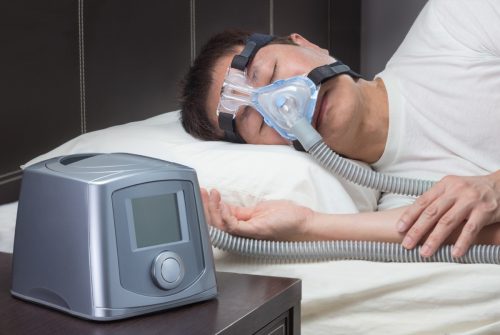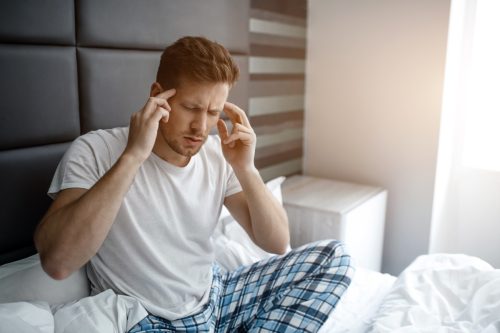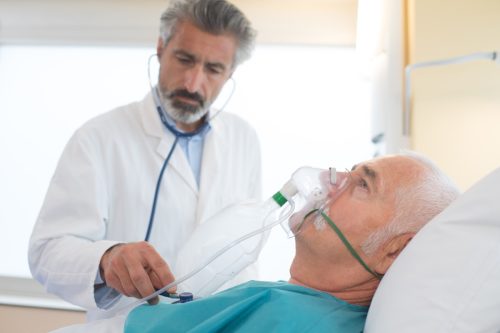With more Americans living longer than ever, heart failure is on the rise. According to the Centers for Disease Control and Prevention (CDC), over six million American adults have heart failure—but contrary to what you might assume, the term “heart failure” doesn’t mean your heart is no longer beating. Rather, heart failure is a serious condition in which your heart doesn’t pump enough blood to keep your body functioning at its best.
Unfortunately, the signs of heart failure can be difficult to spot, and early symptoms often go unnoticed. Signs of heart failure include shortness of breath during daily activities, difficulty breathing when lying down, weight gain, swelling, and fatigue. In addition, studies show that one particular thing you may be doing at night can increase your risk of heart failure. Read on to find out what it is, and how it could be putting your heart in danger.
READ THIS NEXT: Drinking This Daily Can Slash Your Risk of Heart Failure, New Study Says.
If you wake up tired or struggle to keep your eyes open during the day despite getting a full night’s rest, you may be suffering from a common condition that can lead to heart failure. According to a 2018 study published in the Texas Heart Institute Journal, this sleep problem is linked to many heart-related issues, such as hypertension, coronary artery disease, cardiac arrhythmias, sudden cardiac death, and heart failure.
There are two types of heart failure: systolic and diastolic. Systolic heart failure occurs when your heart’s left ventricle doesn’t contract completely, making your heart unable to pump enough blood throughout your body. Diastolic heart failure happens when less blood gets pumped through your body because the left ventricle fails to fill with blood properly.
READ THIS NEXT: If You Notice This While Lying on Your Back, Get Your Heart Checked.

Sleep apnea is a common condition in which your breathing stops and starts frequently throughout the night. This prevents your body from getting enough oxygen, and puts you at risk of health complications. There are two distinct types of sleep apnea related to heart failure: obstructive sleep apnea (OSA) and central sleep apnea (CSA).
“In OSA, the airway partially or completely closes,” explains Harneet Kaur Walia, MD, director of sleep medicine at Baptist Health’s Miami Cardiac & Vascular Institute. “In CSA, there’s no obstruction in the airway. In this kind of sleep apnea, respiratory drive is absent from the brain.”
According to the 2018 study, the prevalence of OSA is substantially higher in people with heart failure than in the general population. “OSA is strongly associated with high blood pressure, abnormal heart rhythm, heart attack, stroke, and heart failure,” warns Kaur Walia. “In patients with heart failure, excessive fluid in the upper airway is an additional factor that may contribute to the airway narrowing. Changes in pressure of the chest related to sleep apnea cause stress on the heart, and this effect is greater in those with heart failure.”

Symptoms of sleep apnea to watch for include snoring, morning headaches, mood disorders, insomnia, and waking in the night due to choking or gasping for air. Other warning signals to look for that may not be as easy to detect include elevated blood pressure and increased sympathetic nervous system activity, such as accelerated heart rate, dilated pupils, constricted blood vessels.
“Individuals who are overweight, have a large neck circumference, smoke, or have chronic lung diseases such as asthma are at increased risk of OSA,” states Jennifer Mieres, MD, professor of cardiology at Zucker School of Medicine. “In addition, there is a higher prevalence of sleep apnea in men; they are two to three times more likely to have sleep apnea than women. The risk increases for women who are obese, and for those who are post-menopausal. Polycystic ovary syndrome, hormonal disorders, and prior stroke can also increase the risk of sleep apnea.”
For more health news sent directly to your inbox, sign up for our daily newsletter.

If you suspect you have sleep apnea, see a doctor who can perform a test to determine if you have OSA. There are two types of tests—nocturnal polysomnography and home sleep tests. During a nocturnal polysomnography test, doctors monitor your heart, lung, and brain activity, breathing patterns, bodily movements, and blood oxygen levels while sleeping. Home sleep tests are simplified tests that your doctor will provide so you can measure your heart rate, breathing patterns, and blood oxygen levels through the night.
The Mayo Clinic reports that there are therapeutic and surgical treatments for sleep apnea. Therapeutic treatment for OSA typically involves equipment that works to keep airway passages open. The most common treatment is continuous positive airway pressure (CPAP)—a device that delivers air pressure through a mask to keep your airway passages open while sleeping. Other therapeutic treatments include oral appliances that keep your throat open, supplemental oxygen, and adaptive servo-ventilation (ASV) air flow devices.
If therapeutic treatments can’t resolve your OSA, surgery may be required. Options include tissue removal from the roof of your mouth and throat, jaw repositioning, nerve stimulation, and forming a new air passageway (also called a tracheostomy). A tracheostomy is only required in extreme cases where OSA is potentially life-threatening. Your doctor may recommend healthy lifestyle habits for milder OSA cases, such as healthy eating, weight loss, avoiding alcohol, and not smoking.